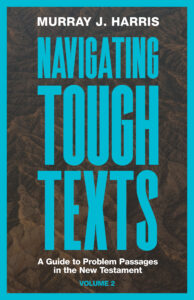
Murray J. Harris is the author of Navigating Tough Texts, Volume 2: A Guide to Problem Passages in the New Testament. In his new book, he concisely considers more than eighty tricky passages in the New Testament, showing how these texts offer insights with implications for theology, apologetics, mission, and the Christian life.
In our interview below, Harris reflects on the story behind writing this second volume of Navigating Tough Texts.
Murray J. Harris is professor emeritus of New Testament exegesis and theology at Trinity Evangelical Theological School. Formerly he was warden of Tyndale House, Cambridge (UK), and faculty member of the Divinity School in the University of Cambridge.
Lexham Press: Can you tell us the story behind Navigating Tough Texts, Volume 2?
Murray Harris: Every reader of the New Testament struggles with difficult verses. “What on earth does this text mean, and how is it relevant to the twenty-first century?” we often ask. But there are satisfactory solutions to all of these difficult verses, if we look carefully at the words used and the wider context.
LP: What contribution do you hope to make with your book?
Harris: I hope to shed encouraging light on some 89 “tough texts” scattered throughout each book of the New Testament. This volume two follows in the footsteps of volume one that dealt with 123 verses. This is not to say that all of the “tough texts” in the New Testament have now been covered, but the reader will discover useful ways to investigate other puzzling verses or passages.
LP: We’d love to hear something surprising about yourself that only your friends would know!
MH: I was the only person from Australia or New Zealand (my country) to serve on the Committee on Bible Translation that produced the New international Version (NIV) back in 1973 (the New Testament) and 1978 (the whole Bible). As an 85-year-old I am one of the few survivors!
The following is an excerpt from the preface to Navigating Tough Texts, Volume 2: A Guide to Problem Passages in the New Testament.
It has been my special privilege to read and teach the Greek New Testament for over fifty years and to be involved in the translation team of the New International Version (NIV) for its first twenty-five years. Again I am delighted to be able to pass on to others some of the treasures buried in the inspired and inspiring text of the NT. Not a few of the studies involve grammatical issues not apparent to readers who do not have access to the original Greek. Some of the studies relate to word meaning and usage, while others stem from the necessary consideration of the immediate context or relevant background data.
The studies are designed for pastors, undergraduate or graduate theological students, and Christians who are eager to reflect deeply about their faith and who are not afraid to be exposed to some of the intricacies of the Greek language.
They are tough texts for several reasons. They may be tough to understand because of a first-century perspective that is foreign to modern readers or because of some linguistic issue related to Greek. They may be tough to apply appropriately in the modern era. Or they may be tough to appreciate, given the long history of divisive and painful controversy that some texts have provoked.
Quite often, discussion of a tough text leads naturally into a wider treatment of major NT themes. As a result, any reader who chooses to work through the whole book, rather than just picking out those particular verses where they want help, can get a concise statement of many important theological topics.
It is my hope and prayer that the insights offered here may prompt in the reader a deeper love of the biblical text, and an enhanced devotion to its ultimate author—and perhaps even a desire to learn Greek!







